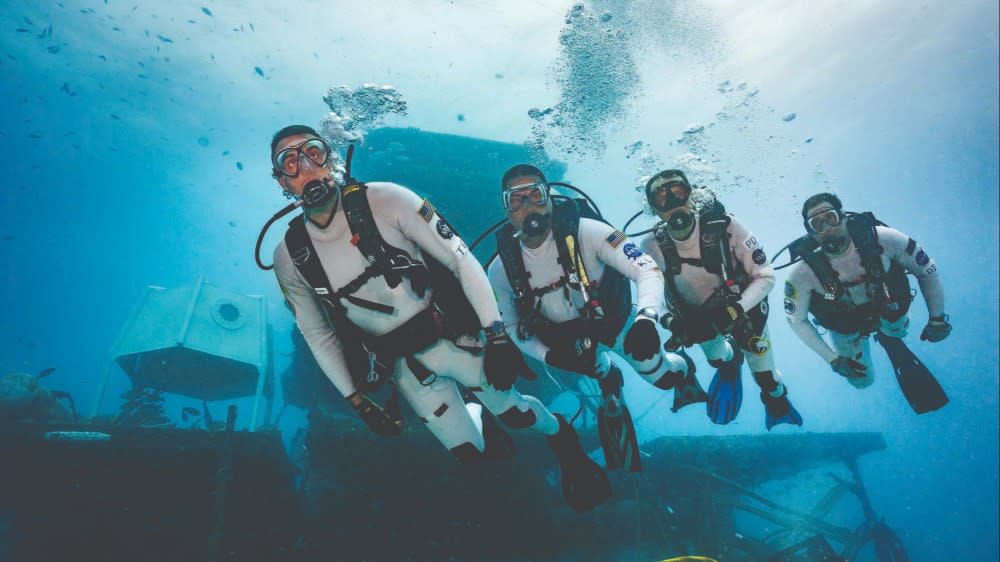For many international students, working in a lab means wearing protective gear in a chilly classroom, surrounded by test tubes. For some students at Florida International University (FIU), however, working in a lab can mean going underwater. At the FIU Institute of Environment, students have a chance to study marine ecosystems and their inhabitants as part of the Medina Aquarius Program. Some have even been known to take up residence in FIU’s Aquarius, located 63 feet below the ocean surface.
Having access to the Medina Aquarius Program may be the opportunity of a lifetime for students interested in a wide range of environmental topics, such as climate change, oceanography, and pollution research. Here, students are able to study alongside scientists currently working in research, management, policy, and education. After all, what is the best way to learn about marine life? At FIU, the answer is simple: study underwater.
What Makes Aquarius Unique
Located in the Florida Keys National Marine Sanctuary, Aquarius is equipped with electricity and web cameras, offering a unique combination of research, education, and outreach. Scientists have the ability to conduct research, monitor the ocean and coral reefs, and bring live education via broadcast to schools, museums, and aquariums everywhere. Students study marine ecosystems and then immediately see how that research can impact students, educators, and policymakers. Visitors can get a good look, too, through a virtual tour and a variety of live webcams.
The Medina Aquarius Program offers marine biologists, scientists, and oceanographers significantly more time underwater to conduct research than traditional programs. These oceanographers can stay at Aquarius for up to two weeks. The ability of researchers to eat, work, sleep, and live on board has led to Aquarius being used by NASA to train astronauts and test equipment for missions to the International Space Station. The US Navy has also taken advantage of Aquarius’ unique capabilities to conduct operations training readiness missions.
The Medina Aquarius Program is equipped to train students in four specialties: Recompression Chamber Operator, Diving Medical Technician, Saturation Diving, and Shark Handling Trauma. Its research has been conducted on more than 120 missions, leading to more than 600 peer-reviewed scientific publications. With $40 million in research funding, the FIU Institute of Environment remains committed to marine and environmental research, conservation, and education. Students interested in oceanography, pollution, climate change, and the health of coral reefs and marine life will find many “only at FIU” research possibilities here.
Opportunities for International Students Beyond Aquarius
While the Aquarius Reef Base — the only undersea research lab in the world — is exceptional, FIU’s Institute of Environment boasts many more research facilities and faculty-led labs. This range of research spaces allows international students a chance to broaden their view of environmental studies, and benefit from expert research on specific environmental subjects and challenges.
The Institute was designed to bring together researchers, scientists, and students from all over the world to work together on the global concerns of environmental conservation and education. As climate change and the effects of pollution become a global focus, international students may find their experience and research leads them to opportunities all over the US — and even the world.
Additionally, through the Institute of Environment, students will also see how environmental research is not limited to scientific publications. FIU student opportunities include research internships, community outreach, K-12 educational programs, and more. Within the Coastlines and Oceans Division, courses range from Scientific Diving to News Visualization, and opportunities for research and outreach provide hands-on experience in a variety of field settings, such as mangrove forests, Everglades wetlands, and shallow coral reefs.
Current and Future Research at Aquarius
Currently, Aquarius is focused on three main research areas: Marine Ecosystem Science and Long-Term Monitoring, Undersea Equipment Testing, and Training and Procedure Development. The FIU Institute of Environment funding currently supports a range of specific environmental research projects focused on oceanography and pollution, such as:
Reducing our plastic footprint
Developing technologies for green and resilient infrastructure
Restoring coral reef ecosystems
Engaging communities in tree preservation
Protecting our world’s tropical species
Promoting community environmental education and environmental education in K-12 curriculum
Beyond FIU, Aquarius is sought after by marine researchers around the world. The univeristy is ranked ninth globally for Impact on Life Below Water by Times Higher Education Impact Rankings. In 2014, Aquarius was home to Fabien Cousteau (grandson of famous oceanographer Jacques-Yves Cousteau) for 31 days. He hoped his mission would bring more attention to oceanography and marine conservation efforts. Science has always encouraged international collaboration; Aquarius brings that collaboration underwater.
Discover Florida International University >
